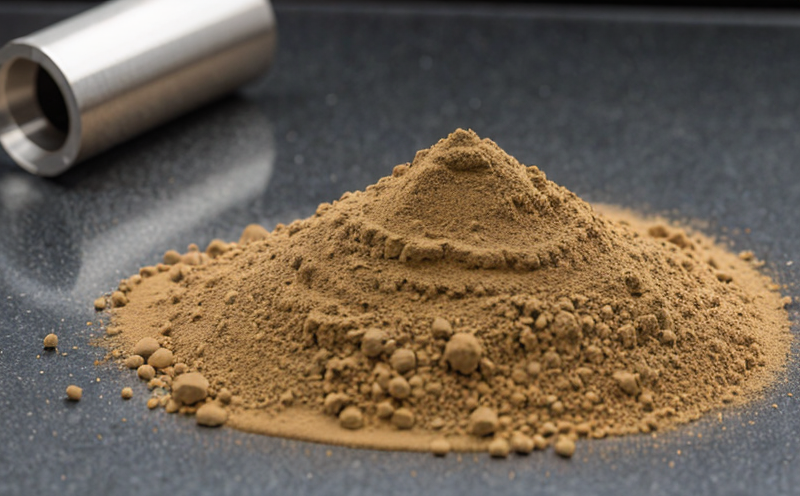ISO 11358 Thermal Stability Testing of Raw Materials
The ISO 11358 standard provides a method for determining the thermal stability of raw materials used in additive manufacturing and 3D printing processes. This testing is crucial to ensure that the selected raw materials can withstand the rigorous conditions encountered during additive manufacturing cycles without degrading or losing their desirable properties.
Thermal stability plays a pivotal role in ensuring the reliability and performance of parts manufactured through additive manufacturing (AM). Materials such as polymers, metals, ceramics, and composites are subject to high temperatures during AM processes. Understanding how these materials behave under thermal stress is essential for optimizing production parameters and ensuring product quality.
The testing procedure outlined in ISO 11358 involves heating the raw material sample at a controlled rate until it reaches its decomposition temperature (Td). The test apparatus typically includes an oven or furnace capable of precise temperature control, with thermocouples to monitor the specimen's temperature accurately. Specimen preparation is critical; samples must be cut into standard dimensions and shapes that allow for consistent heat distribution.
Once prepared, the sample is subjected to a heating rate ranging from 5°C/min to 100°C/min, depending on the material type. The test continues until the specimen shows signs of decomposition or reaches its specified upper limit temperature. Decomposition can be observed through visual changes in color, weight loss, or other physical indicators. Temperature data is recorded throughout the process and analyzed using statistical methods.
The results of this testing are vital for several reasons:
- To ensure that raw materials meet the required thermal stability criteria specified by industry standards.
- To identify potential issues with material quality early in the supply chain, preventing costly rejections downstream.
- To optimize production processes and reduce waste by selecting materials that can withstand specific temperature conditions without degradation.
Understanding the thermal stability of raw materials is particularly important for applications where parts are exposed to high temperatures during their service life. For example, in aerospace, automotive, or medical devices, ensuring that 3D printed components remain stable under operational temperatures enhances product reliability and safety.
In conclusion, ISO 11358 thermal stability testing of raw materials is a critical step in the additive manufacturing process. It helps ensure that the selected materials are suitable for the intended applications, thereby improving overall product quality and performance.
Eurolab Advantages
At Eurolab, we offer comprehensive ISO 11358 thermal stability testing services tailored to meet the specific needs of additive manufacturing and 3D printing industries. Our advanced facilities provide precise temperature control and state-of-the-art instrumentation to ensure accurate and reliable test results.
Our team of experienced professionals ensures that all samples are prepared according to industry standards, ensuring consistent and reproducible results. We offer quick turnaround times, allowing clients to receive their reports promptly. Our commitment to quality is further demonstrated through our strict adherence to international standards such as ISO 11358.
With Eurolab's expertise in additive manufacturing testing, we provide valuable insights into material performance and durability, helping clients make informed decisions about their raw materials. Our services are designed to enhance product reliability and ensure compliance with industry regulations.
Competitive Advantage and Market Impact
- Precision and Reliability: Our advanced facilities and experienced professionals provide precise temperature control, ensuring accurate and reliable test results. This precision is critical in the competitive AM market where even small discrepancies can lead to significant differences in product performance.
- Compliance with International Standards: We strictly adhere to international standards such as ISO 11358, ensuring that our clients' materials meet the highest quality and safety requirements. This compliance enhances their reputation and market position.
- Rapid Turnaround Times: Our quick turnaround times allow clients to receive their reports promptly, enabling faster decision-making processes and quicker time-to-market for new products.
The ability to accurately characterize raw materials based on their thermal stability can give companies a significant competitive edge. By selecting materials that meet the required standards, businesses can reduce costs associated with material rejections and improve product quality. This, in turn, enhances customer satisfaction and loyalty, contributing positively to market share growth.
Use Cases and Application Examples
The ISO 11358 thermal stability testing of raw materials is particularly relevant for various sectors including aerospace, automotive, medical devices, electronics, and consumer goods. Here are some specific use cases:
- Aerospace Industry: Ensuring that parts used in high-temperature environments remain stable during manufacturing processes.
- Automotive Sector: Evaluating materials for engine components exposed to extreme temperatures.
- Medical Devices: Assessing the stability of implants and other medical devices under thermal stress conditions.
- Electronics Industry: Characterizing materials used in printed circuit boards that may be subjected to high operating temperatures.
In each case, understanding the thermal stability of raw materials helps manufacturers optimize their processes and select materials that meet strict quality standards. This not only enhances product reliability but also ensures compliance with industry regulations.





